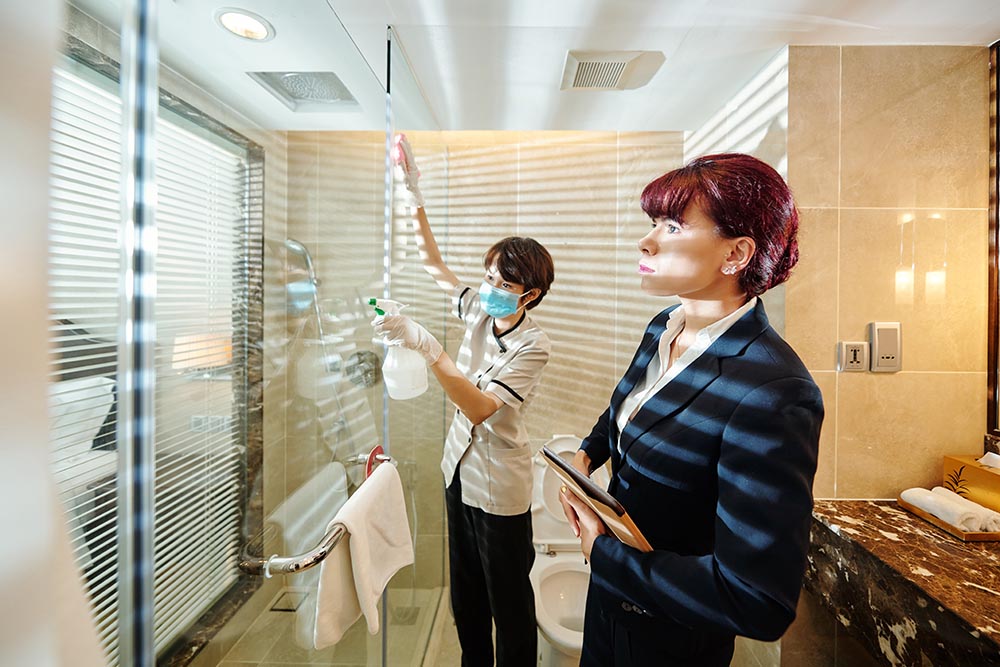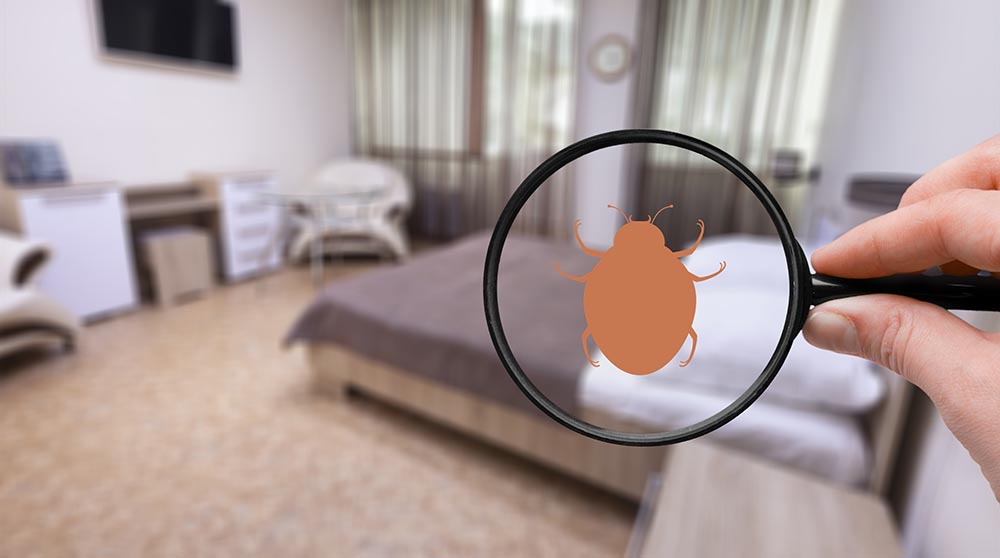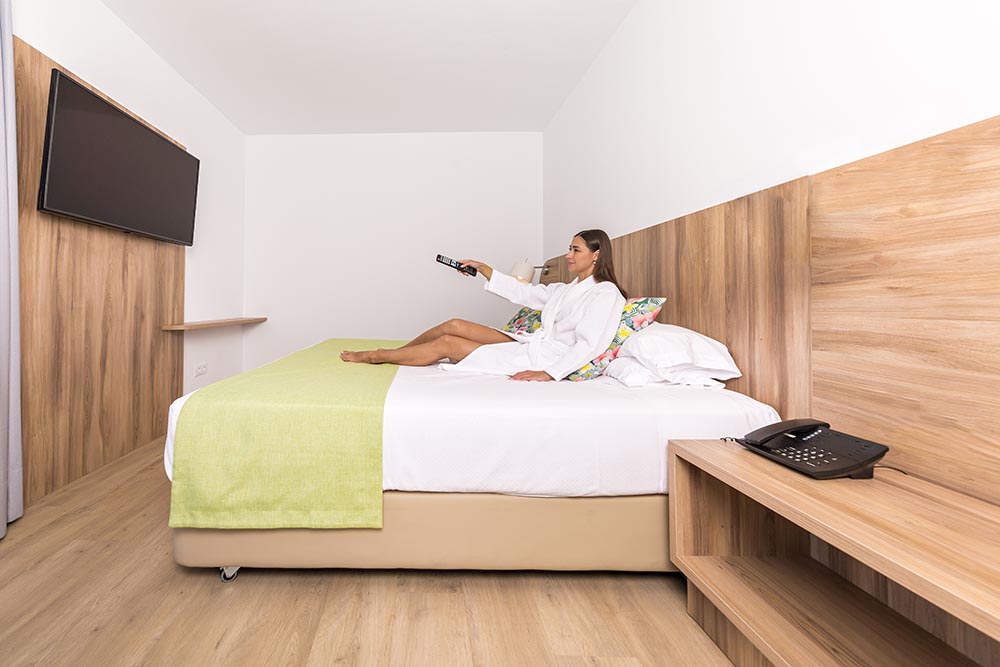Can you imagine checking into a hotel only to find that your room is infested with cockroaches? Or to be sitting in the reception area waiting to check in and spot a rat scuttling off in the direction of the restaurant? One thing is for certain: you likely won’t stay and nor will you be likely to return.
Pest control is arguably one of the most important aspects of running a hospitality business. It is critical for the health and safety of your guests – and indeed their comfort.
If you wish to protect your reputation and keep your business thriving, this is the article for you. We’re going to talk about the various pest control methods hotels use, which pests are most common, and whether or not spraying for bugs is a viable alternative.

What pest control is carried out in hotels?
So, what type of pest control is carried out in hotels? Ultimately, the biggest defence for hotels against pests is cleanliness.
In order to keep those pesky pests out, preventative measures must be taken. This means adhering to the highest levels of cleanliness as possible.
Fortunately, this is a win-win as not only are guests looking for a clean and tidy hotel to relax in, but one that is free of creepy crawlies and rodents as well!
- Deeper cleaning methods: in essence, the key is to remove anything that will invariably attract pests. This means any leftover food from room service.Housekeeping is the final bastion against critters and thus they should be well trained in how to identify potential pests (e.g., bed bugs) and clean thoroughly so as to keep them out.
- Proper storage of foods: especially in hotels with restaurants, the kitchen should be very well maintained. A large part of this is keeping all food stored properly.
- Regularly emptying trash: kitchen trash cans should be emptied regularly throughout the shift, just as the bins in hotel rooms should be emptied on a daily basis. This is critical in keeping nasty pests such as cockroaches from snooping around for rotting food waste.
- Good maintenance: good maintenance is another important aspect of pest prevention – particularly when it comes to plumbing. For example, leaky taps and toilets provide plenty of free water for pests which is something that they are always on the lookout for.
It’s important to understand that cleaning alone is not enough to keep pests out. Unfortunately, when pests want in, they’ll find a way! In this event, commercial pest control services are highly recommended.
It may be tempting to try and deal with a pest problem in-house, however, this comes at a tremendous risk. The fact is, if your pest problem is discovered and you have failed to handle the situation adequately, it could lead to very damaging consequences – not only to your reputation, but your business as well (forced closure and heavy fines are not uncommon).

What pests are common in hotels?
So, what pests are most common in hotels? Obviously, this largely depends on what country your hotel is based in. In some tropical climates, pests are very much a part of life and something that is practically impossible to control. For example, mosquitos in Thailand are relentless and no amount of room cleaning will keep them out.
As for the UK, here are some of the most common pests that hotels have to contend with:
- Rodents: mice and rats are a very common pest and these are among the most dangerous. Not only do they spread all manner of disease, but if spotted in a respectable hotel, it can cause irreparable damage to your reputation.
- Bed bugs: bed bugs are the bane of most hotels day to day. This is because they are highly disruptive, difficult to remove, and more importantly – very hard to spot! There’s nothing worse than a guest reporting having bites and bumps all over their body have a night spent in a hotel.
- Birds: seagulls are noisy and tend to be rampant near hotels in coastal areas. From scuttling on the roof, squawking in the day, and swopping down to pinch food, birds can be a terrible nuisance for hotels.
- Moles: moles can leave unsightly mole hills on golf courses and in hotel gardens. Additionally, when their tunnels give way underfoot it can cause serious injury.
- Moths: moths can cause damage to carpets, rugs, and other soft furnishings in hotels. Additionally, they’re more of an irritant than anything else, making guests feel uncomfortable.
- Flies: flies can spread diseases like gastroenteritis, particularly when they come into contact with food.
- Cockroaches: while less common in the UK, roaches are still a nocturnal nuisance for hotels. These are among the most feared pest in the UK (besides spiders), and thus you should take every necessary precaution to try and prevent their presence.

Do hotels spray for pests and bugs?
Spraying hotels for bugs is becoming less and less common, particularly with the more toxic pest and insecticides. The fact is, any residual bug sprays can be harmful to the health & safety of your guests, especially those with respiratory problems such as asthma.
Again, the biggest defence against pests in hotels is prevention. As such, you’ll find that regular inspection is a large part of a hotels pest control policy. With regular pest inspections, coupled with ruthlessly vigilant pest prevention methods, it can yield some excellent results.
Of course, if in the event of an infestation, an expert commercial pest control company will identify the type and severity of infestation and prescribe the appropriate treatment from there.
These solutions will likely be non-chemical methods so as to ensure a less dangerous and invasive approach.

Conclusion
Let’s recap:
- The most effective form of pest control in hotels is prevention & regular site inspection. Through deep cleaning, proper maintenance, and training all staff to be able to identify potential problems, you can very effectively keep your pest problems to a minimum.
- In emergency situations, an expert commercial pest control company will likely use non-chemical solutions.
- The most common pests in hotels are bed bugs, rodents, flies, moths, and roaches.











